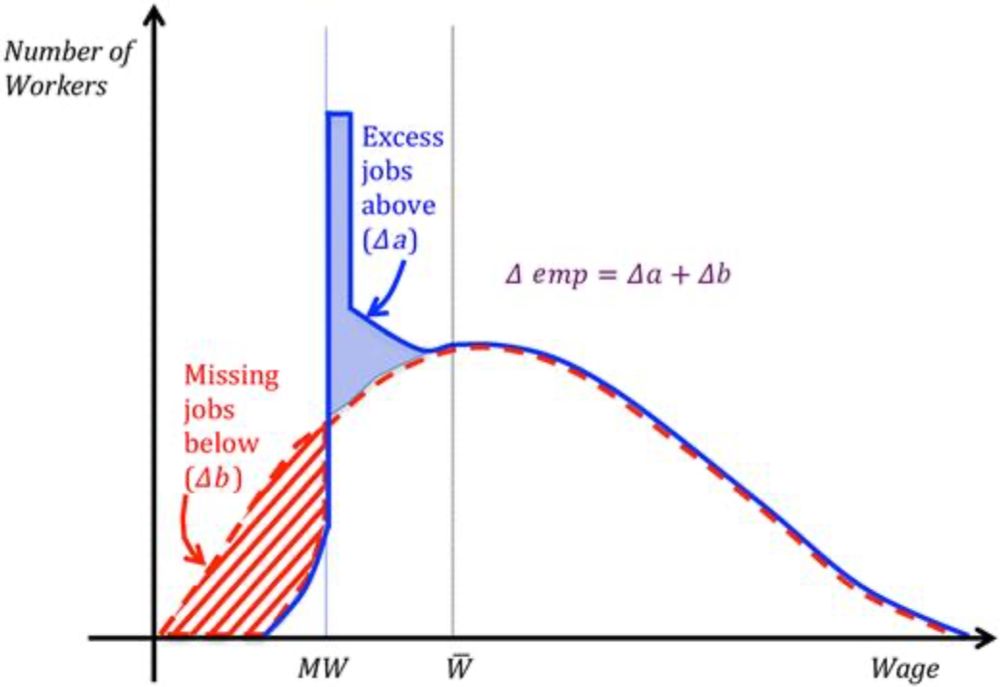
@arindube.bsky.social is your guy
29.11.2024 03:57 — 👍 3 🔁 0 💬 1 📌 0@dthompson.bsky.social
Researcher studying US elections. Asst Prof of Political Science, UCLA.
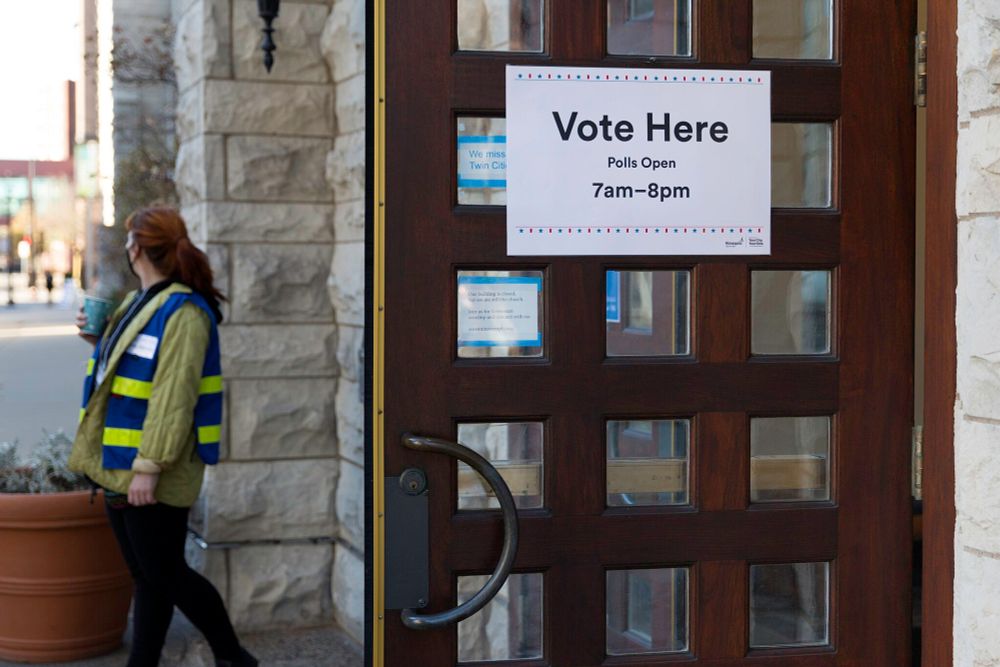
Just-published research shows that partisan election officials don't appear to favor their own party. New from me @goodauth.bsky.social:
goodauthority.org/news/partisa...
That's a fair point. I certainly understand the concern and it's something we'll keep in mind when updating the paper. Generally, I use questions in titles to indicate that the paper comes from a place of genuine uncertainty about the result, but I appreciate your point.
17.10.2023 21:21 — 👍 2 🔁 0 💬 0 📌 0Worth noting that we always have the same number of clusters, the N is just a matter of whether the data is long or wide
12.10.2023 21:48 — 👍 0 🔁 0 💬 1 📌 0I meant to “Apoorva and I” haha. Back to the good old days without an edit button.
12.10.2023 20:27 — 👍 0 🔁 0 💬 0 📌 0There are so many potential estimators in this setting, and @apoorvalal.com found it super interesting to unpack them together. The table you're pointing has five pretty different estimators. Synth (col 2) doesn't regularize so it overfits and the ses blow up. We should dig into the big se from ebal
12.10.2023 19:09 — 👍 1 🔁 0 💬 3 📌 0I feel like a grumpy old guy when I explain what it was like to run areg and wait for an evening back in the days before reghdfe
11.10.2023 03:05 — 👍 1 🔁 0 💬 0 📌 0There's more in the paper validating the design and exploring why Democratic counties were more likely to apply.
We welcome your comments!
bit.ly/lal_thompson...
We benchmark the size of these effects against the margin in the 2020 presidential election in a number of ways. While every benchmarking exercise has flaws, these exercises suggest that the grants did not swing the election from Trump to Biden.
10.10.2023 16:17 — 👍 0 🔁 0 💬 1 📌 0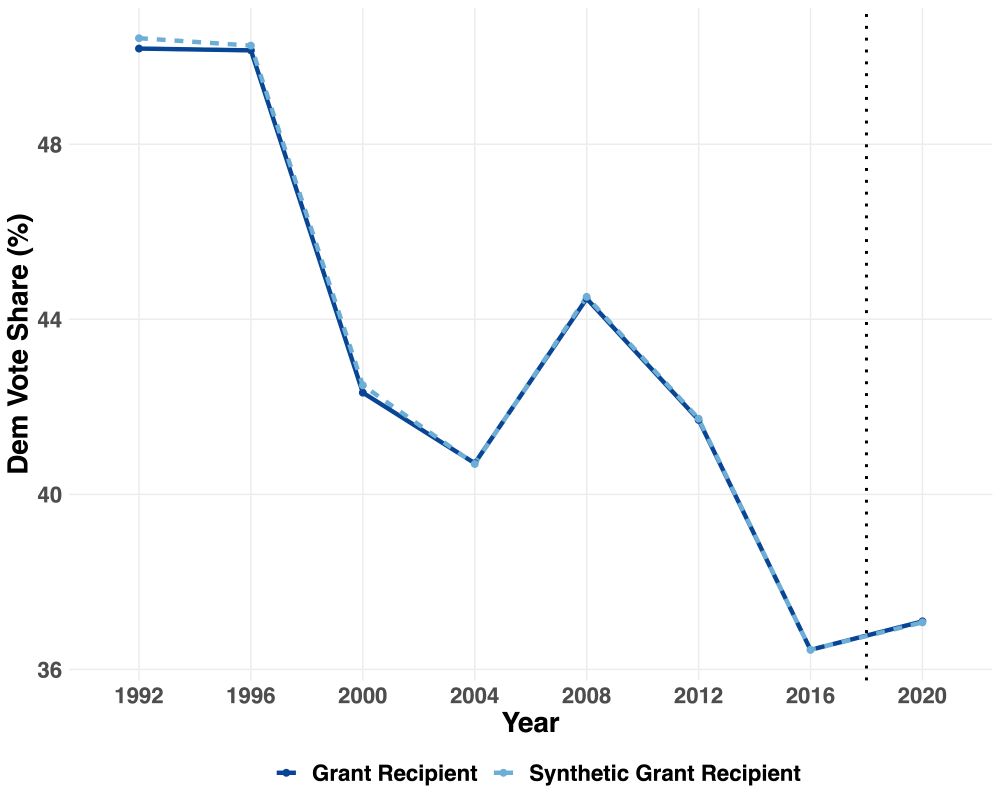
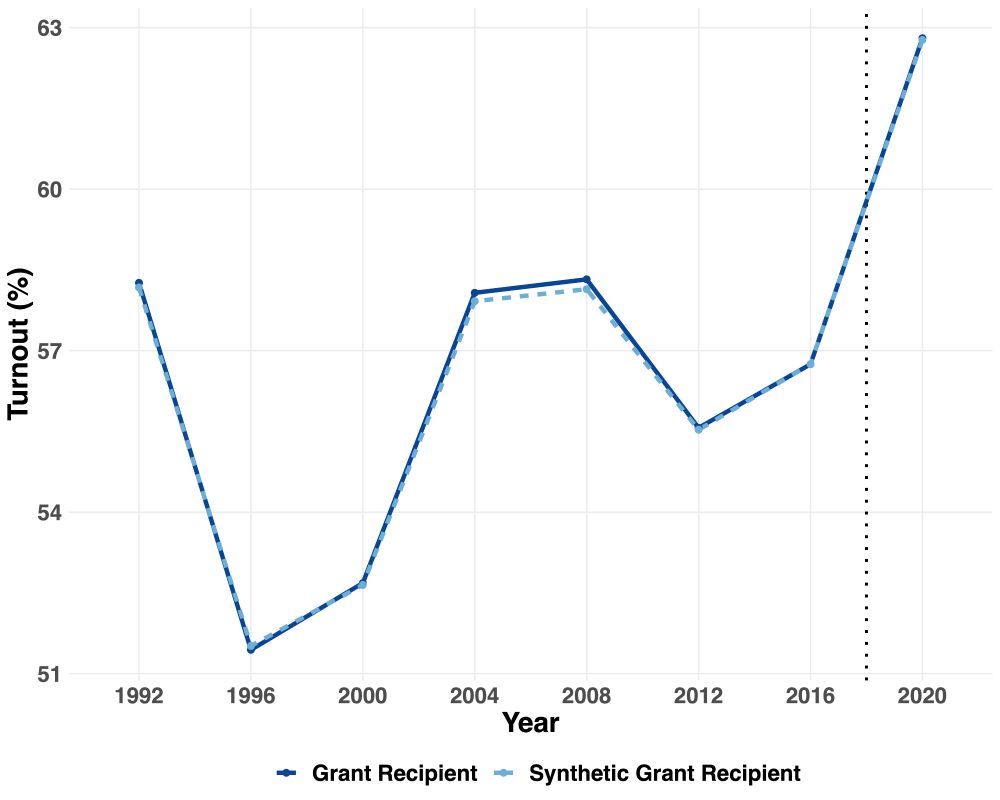
After selecting weights that put counties that did not apply for the grants on the same trajectory as recipients before 2020, we find that the grants did not substantially increase turnout or Democratic vote share in 2020. (We're using synthetic diff-in-diff weights.)
10.10.2023 16:09 — 👍 0 🔁 0 💬 1 📌 0Even though Democrats applied for and received the funding at much higher rates, we find that the grants did not noticeably advantage Democrats in the 2020 election.
10.10.2023 16:08 — 👍 0 🔁 0 💬 1 📌 0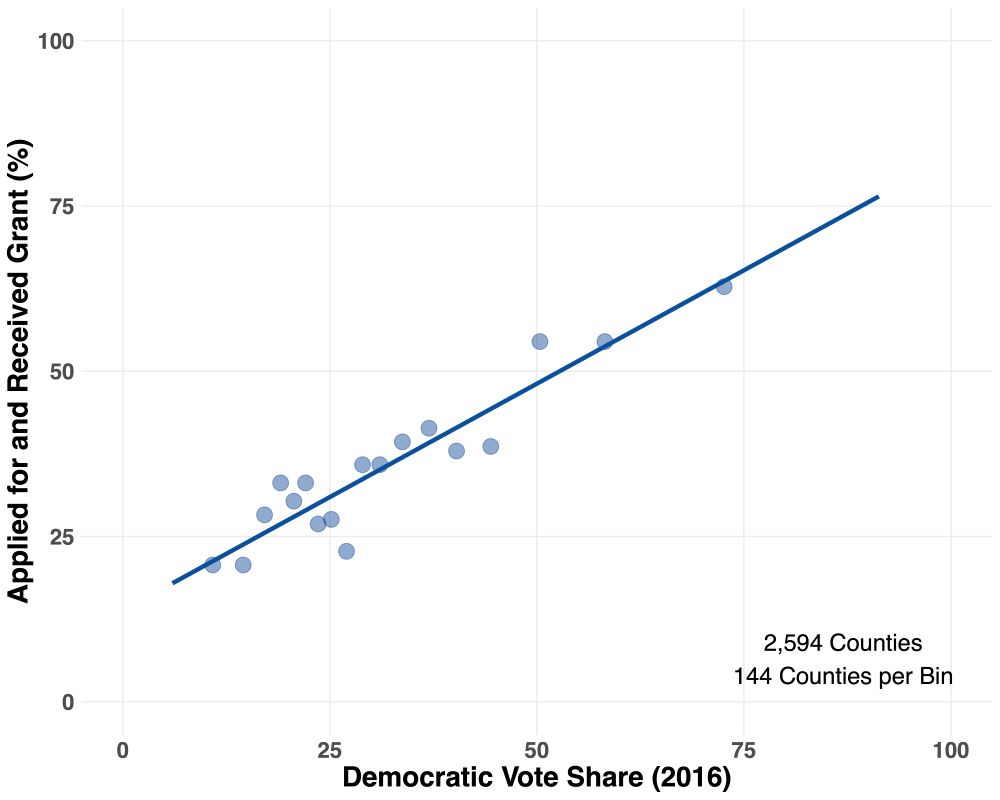
Using administrative data on which counties applied for and received the grants, we document that counties that supported Clinton in 2016 were substantially more likely to apply for and receive a grant.
10.10.2023 16:07 — 👍 0 🔁 0 💬 1 📌 0The CTCL's grantmaking process was neutral---every eligible local election office that applied received a grant. But critics point out that Democratic counties were much more likely to apply, potentially advantaging Democratic candidates.
10.10.2023 16:06 — 👍 0 🔁 0 💬 1 📌 0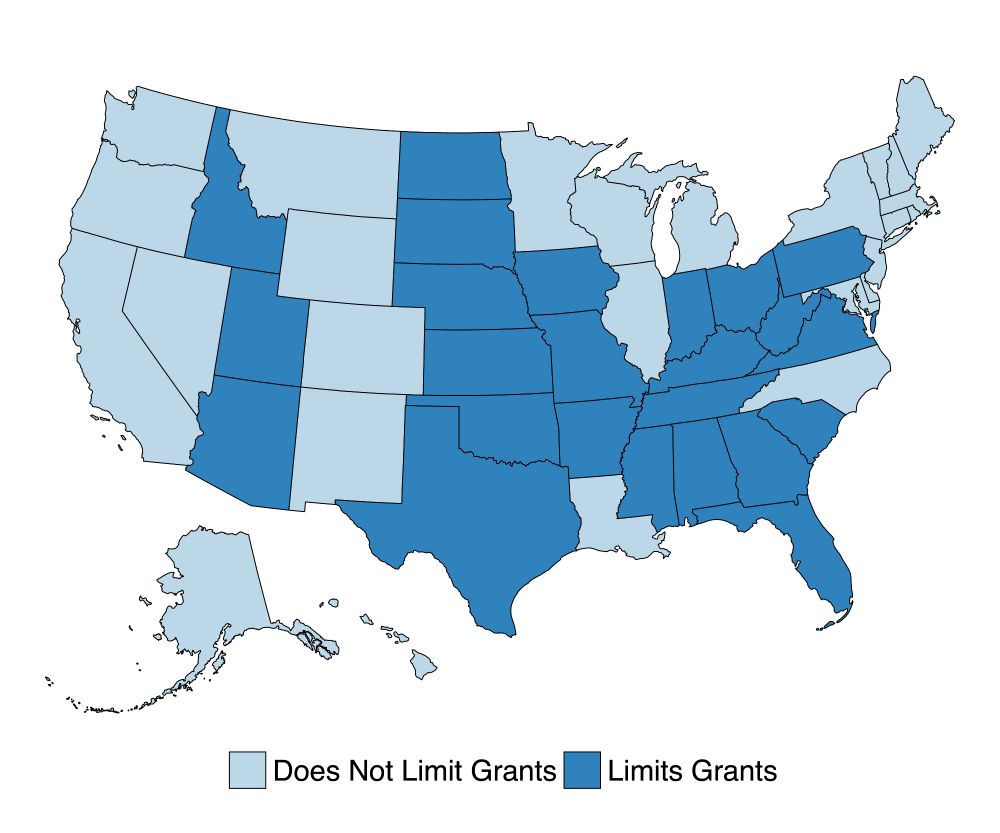
The largest private election administration grant program in 2020 (~$350M) was run by the Center for Tech and Civic Life and funded by Mark Zuckerberg and Priscilla Chan. This funding has been highly controversial with 24 states banning future grants.
10.10.2023 16:05 — 👍 0 🔁 0 💬 1 📌 0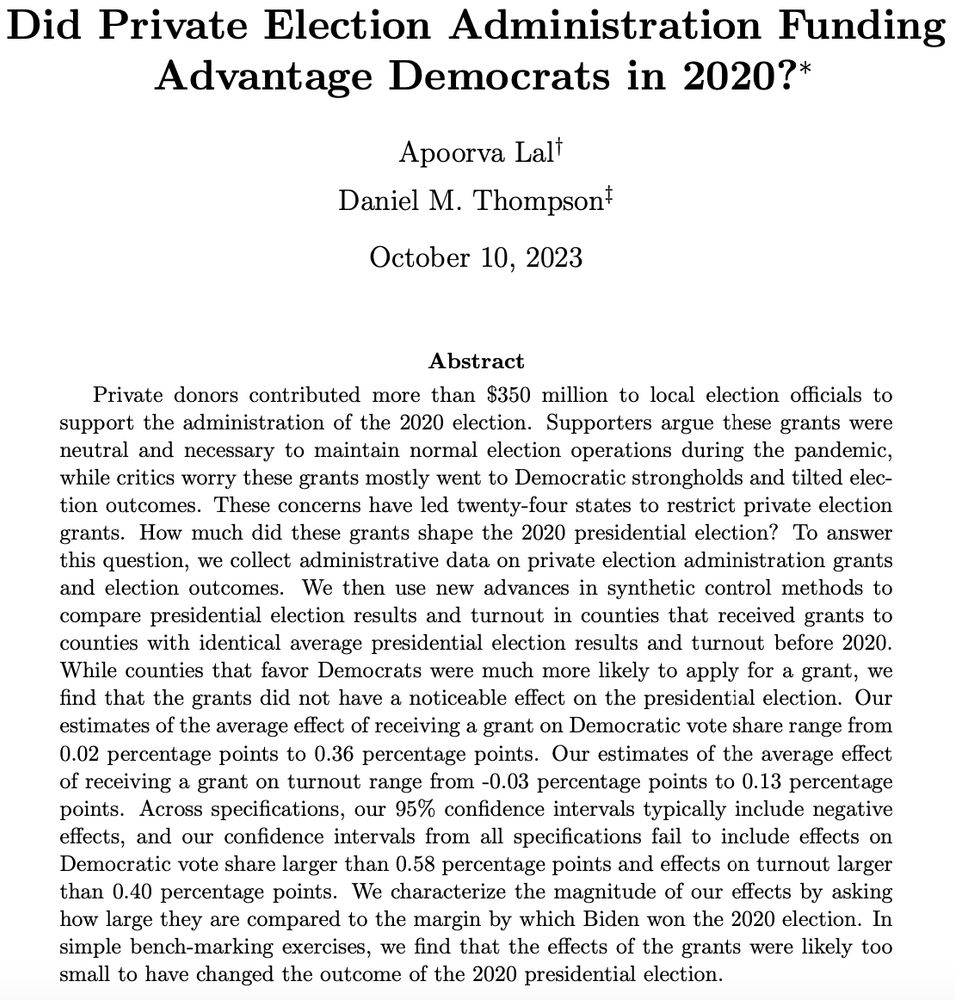
Private donors gave more than $350M to support election administration in 2020. Many critics argued that these grants swung the election from Trump to Biden. In a new paper, @apoorvalal.com and I find that these grants did not provide Democrats a noticeable advantage.
bit.ly/lal_thompson...
thank you Jim Snyder for your hilarious but simple hack for making tex tables
26.09.2023 19:09 — 👍 1 🔁 0 💬 0 📌 0I feel like I'm being subtweeted
26.09.2023 19:00 — 👍 1 🔁 0 💬 1 📌 0Guess I should post something here, so I’m linking my job market paper! I examine the effects of ideological polarization on local politics through the lens of police union endorsements. tinyurl.com/2s7kdpem
26.09.2023 02:16 — 👍 42 🔁 14 💬 2 📌 1
Partisan election administrators don’t tip the scales
Electing a Democratic or Republican clerk doesn't change election results or turnout
New #ScienceOfPolitics podcast / interview transcript with Daniel Thompson
www.niskanencenter.org/partisan-ele...
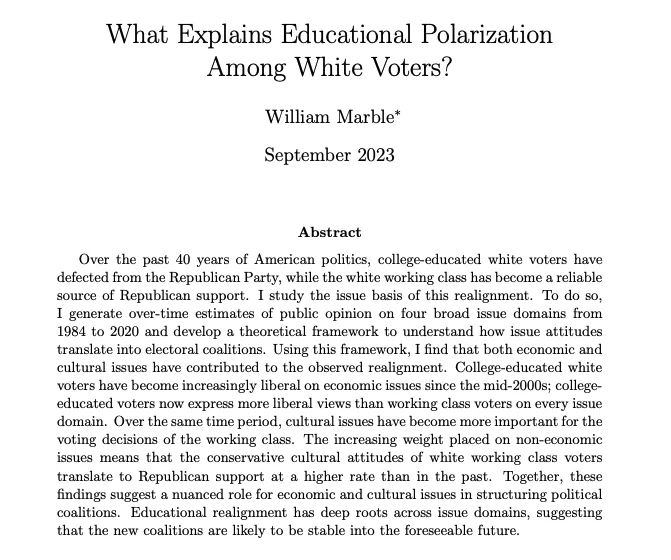
Title page for the paper "What Explains Educational Polarization Among White Voters? by William Marble (September 2023). Abstract: Over the past 40 years of American politics, college-educated white voters have defected from the Republican Party, while the white working class has become a reliable source of Republican support. I study the issue basis of this realignment. To do so, I generate over-time estimates of public opinion on four broad issue domains from 1984 to 2020 and develop a theoretical framework to understand how issue attitudes translate into electoral coalitions. Using this framework, I find that both economic and cultural issues have contributed to the observed realignment. College-educated white voters have become increasingly liberal on economic issues since the mid-2000s; college-educated voters now express more liberal views than working class voters on every issue domain. Over the same time period, cultural issues have become more important for the voting decision
The white working class has steadily become part of the Republican base while whites w/ college degrees have become Democratic. In a new paper, I study the issue basis of this realignment, showing that both economic and cultural issues have contributed.
williammarble.co/docs/EducPol...
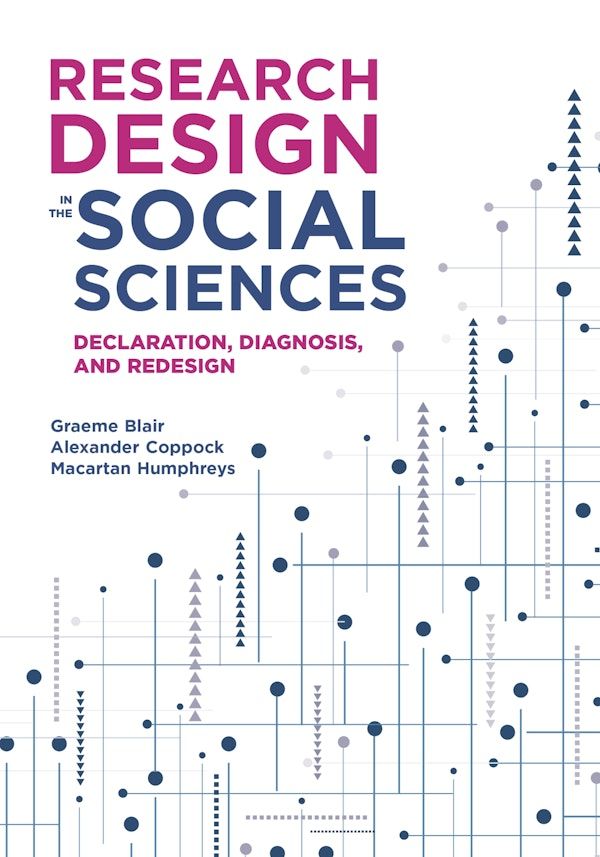
Cover of Research Design in the Social Sciences: Declaration, Diagnosis, and Redesign by Graeme Blair, Alexander Coppock, and Macartan Humphreys
It's publication day for "Research Design: Declaration, Diagnosis, and Redesign" from @PrincetonUPress!
-- or more memorably, "the DeclareDesign book"
illustrious coauthors: @graemeblair.bsky.social and Macartan Humphreys
amazon: tinyurl.com/rdssddr
free online: book.declaredesign.org
Thread!